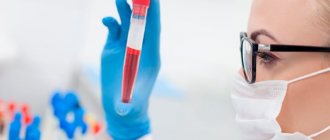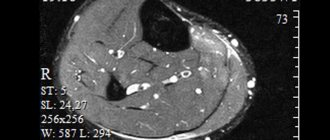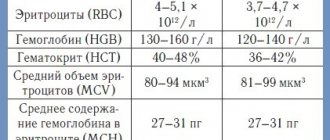Published: 04/28/2018 Updated: 03/10/2021
Physiologically, the human body is configured for high energy expenditures, to which our ancestors were accustomed. However, with the development of civilization, the energy consumption of modern humans has decreased by 2-2.5 times, but people have not eaten less. In a stressful world, food is an easy way to find pleasure.
To stay healthy, the number of calories burned must equal the number of calories received. If this rule does not apply, extra pounds inevitably accumulate, causing obesity, atherosclerosis, hypertension and diabetes. Therefore, in order not to gain weight, you need to eat less.
But by reducing food portions, we inevitably reduce the amount of nutrients entering the body. These are not only vitamins, but also amino acids, polyphenolic compounds, and bioflavonoids. Even the most correct diet (2500 kcal per day) will lag behind the vitamin norm by 20-30%!
How are tests for vitamins and microelements carried out?
In order to determine the content of vitamins and minerals in the body, various studies are used. The patient's biomaterials are used: whole blood or serum, hair, nails, urine. A general test for vitamins gives results in 1 working day, and a comprehensive analysis for microelements takes much longer - up to 6 working days. Most often, blood diagnostics are used; you must come to the medical laboratory in the morning and on an empty stomach (after an 8-hour overnight fast).
How to Find a Problem Using Lab Tests
To find out whether there are enough vitamins and minerals in the body, CITILAB doctors have developed a special profile 99-00-801 - the “Source of Health” vitamin and mineral complex. It is part of the Ecology of Life series.
The studies included in this profile simultaneously identify deficiencies and/or excesses of vitamins and minerals. This will help to correct violations in a timely manner and prevent health problems. In addition, the profile includes a comprehensive blood test for the presence of heavy metals and trace elements, an “overdose” of which can lead to a deterioration in well-being. The results of the study are interpreted by a qualified physician.
Profile composition:
- 95-10-200 – Vitamin A (retinol)
- 95-10-205 – Vitamin E (tocopherol)
- 95-10-206 – Vitamin K1 (phylloquinone)
- 26-20-001 – General calcium
- 95-10-201 – Vitamin B1 (thiamine)
- 95-10-202 – Vitamin B5 (pantothenic acid)
- 95-10-203 – Vitamin B6 (pyridoxine)
- 33-20-038 – Folic acid (folates)
- 35-20-010 – 25-OH-Vitamin D
- 33-20-045 – Vitamin B12
- 99-10-100 – Comprehensive blood test for the presence of heavy metals and trace elements
Be healthy!
Author:
Baktyshev Alexey Ilyich, General Practitioner (family doctor), Ultrasound Doctor, Chief Physician
Who should undergo testing for vitamins and microelements:
- During pregnancy planning, pregnancy and breastfeeding.
- After breastfeeding is completed.
- Women prone to heavy menstruation.
- Children in the active growth phase.
- Teenagers during puberty.
- People who constantly adhere to strict diets.
- To everyone who is employed in heavy and hazardous industries.
- People who live in an environmentally unfavorable area.
- For those who are susceptible to chronic pathologies, stress, after chemotherapy.
- To everyone who experiences symptoms of spring vitamin deficiency.
- To old people.
Numerous group of B vitamins
At any age, a person should receive all the necessary vitamins. A deficiency of any of them can contribute to the development of pathologies. The B group of vitamins regulates metabolic processes in the body. Vitamins B1, B6, B12 are nootropics; they improve the functioning of the nervous system.
Each vitamin has its own purpose:
B1 is necessary to maintain energy metabolism. It maintains a normal heart, helps improve the functioning of the nervous system, and normalizes the functioning of the gastrointestinal tract. B1 is very important for children and adolescents, as it contributes to the normal development of the growing body.
B2 takes part in metabolism, normalizes the functioning of the circulatory and nervous systems.
One of its main functions is to strengthen blood vessels and capillaries. Also, it has a positive effect on the functioning of the thyroid gland and adrenal glands, improves the condition of the skin, hair, and nails.
B3 helps improve blood circulation, strengthen veins and blood vessels, normalize cholesterol levels in the blood, and maintain freshness and beauty of the skin. It also takes part in the synthesis of certain hormones.
B5 produces adrenal hormones and helps in the production of neurotransmitters, improves metabolism and intestinal function.
B6 is responsible for strengthening the heart and blood vessels, maintaining immunity. It improves mood and reduces irritability. It helps improve the appearance of hair, skin, and nails.
B7 normalizes blood sugar levels, gives hair strength, normalizes the functioning of the sebaceous glands, and helps improve the functioning of the nervous system.
B8 increases concentration, helps strengthen memory, reduces neurosis and prevents panic attacks. It also acts as a liver protector from the accumulation of fats and cholesterol.
B9 improves metabolism and prevents the occurrence of fetal pathologies in pregnant women. Normalizes the functioning of the intestines and liver, promotes the production of red blood cells.
B12 has a beneficial effect on the nervous system and activates intellectual abilities. It also improves mood and reduces the risk of stroke or heart attack.
The importance of vitamins and microelements
Cobalt is a component of vitamin B12, is involved in hematopoiesis, and is important for the functioning of the nervous system. Cobalt deficiency leads to diseases such as pernicious anemia, funicular myelosis, megaloblastic anemia. Excess has a toxic effect. The normal level of cobalt in blood serum is 0.00045–0.001 mcg/ml.
Copper is a structural component of many enzymes and important proteins. A deficiency leads to impaired pigmentation of hair and skin, anemia, osteoporosis, and damage to bones and joints. And excess leads to poisoning. The norm of the presence of copper in blood serum:
- men 0.75–1.5 mcg/ml;
- women 0.85–1.8 mcg/ml.
Molybdenum is part of some metalloenzymes. Molybdenum deficiency occurs only during prolonged artificial parenteral nutrition. Reference blood levels are 0.0004–0.0015 mcg/ml.
Selenium is important for the functioning of the thyroid gland. Deficiency can lead to mental disorders, decreased immunity and the body's defense against certain types of cancer. Excess causes poisoning. The normal level in blood serum is 0.07–0.12 mcg/ml.
Zinc plays a key role in the synthesis of protein and nucleic acids. Zinc deficiency occurs due to foods low in animal proteins. In addition, iron supplementation may reduce zinc absorption. The normal level of zinc in the blood is 0.75–1.50 mcg/ml.
Manganese - participates in the formation of connective tissue and bones. A low level in such diseases as multiple sclerosis, vitiligo, diabetes mellitus, etc. An excess is manifested by neurotic syndromes, hypothyroidism, and in children - rickets. Chronic manganese poisoning is typical for hazardous industries. Reference values are 0.007–0.015 μg/ml.
Vitamins
Vitamin A: deficiency leads to the development of night blindness. An excess can disrupt the development of the fetus and cause poisoning.
Vitamin B: Deficiency is associated with skin diseases, mental disorders, metabolic disorders, poor vision and memory, hair loss, joint pain and liver dysfunction. Deficiency leads to scurvy and nosebleeds.
Vitamin D: deficiency leads to the development of rickets and softening of bones.
Vitamin E: Deficiency causes neuromuscular disorders, myopathy and anemia.
Content standards:
- D - 25–80 ng/ml;
- B12 - 187–883 ng/ml;
- B9 - 3.1–20.5 ng/ml.
When choosing a vitamin-mineral complex at the pharmacy, we first of all pay attention to how much vitamins C, B and E it contains as a percentage of the daily value. We usually ignore the inscription informing about the content of zinc, magnesium, selenium and phosphorus in the preparation. Yes, we know that it is good for the body. But who wants to remember school chemistry?
Meanwhile, there are 86 microelements in the human body. Some of them are called structural, since they make up 99% of the elemental composition of the human body. These include: carbon, oxygen, hydrogen, nitrogen, calcium, magnesium, sodium, potassium, chlorine, phosphorus, sulfur, iron. The growth, development and health of the body directly depend on the amount of minerals: they affect hematopoiesis, bone formation, absorption processes in the intestines, are responsible for the acid-base balance, perform the function of nerve conduction, intracellular respiration and much more.
Unfortunately, living in the city, we receive not only useful microelements. Our health is at risk from the accumulation of heavy metals that cause intoxication, or, more simply, poisoning. Symptoms of the accumulation of mercury, lead, arsenic, cadmium, nickel are weakness, sleep and appetite disturbances, irritability, dull skin and hair, broken nails and, of course, memory deterioration, concentration decreases, and vision deteriorates. Tatyana Semenchenya, a doctor at the independent INVITRO laboratory, talks about the role of each element in the human body.
Copper
The largest amounts of copper are found in the liver, kidneys, heart and brain. And this microelement is excreted mainly with bile. Copper poisoning when it is contained in excess in water or food products and enters the body in large quantities is accompanied by nausea, vomiting, diarrhea, which can lead to the development of hemolytic anemia, renal and liver failure, and neurological disorders. Copper deficiency can lead to anemia and, in premature babies, to delayed psychomotor development.
Selenium
The role of selenium is not yet fully understood, however, it is believed that selenium has an antioxidant effect on the body, slowing down aging. Stimulates the production of collagen in the skin to maintain elasticity and helps eliminate dandruff.
In combination with vitamin E, selenium participates in the processes of reproduction, development of a young body and in a certain way affects life expectancy. When it is deficient, arsenic and cadmium accumulate in the body and calcium levels decrease. Selenium supports the functioning of the immune system. It can also reduce the likelihood of developing cancer.
Zinc
Foods that contain zinc are cereal grains, legumes, cocoa, seafood, mushrooms, onions, potatoes, and cow's milk. Zinc affects the hormonal levels of the body, is responsible for puberty, and affects fat, protein and carbohydrate metabolism. It is believed that zinc has a lipotropic effect, that is, it is able to break down fat cells.
It is also necessary to remember about a possible excess of this substance in the body, which can lead to growth retardation. A lack of zinc contributes to overexcitation of the nervous system, rapid fatigue, hair loss, and threatens infertility.
Iodine
A unique substance that is part of all plants. Iodine deficiency can lead to serious diseases - and this is not only thyroid disease, as is commonly believed, but also the development of mental retardation - cretinism - precisely in childhood! If there is a lack of iodine, the child stops growing and the entire structure of the body changes.
Excess iodine is characterized by sweating, irritability, tachycardia (rapid heartbeat), a person loses weight, a tendency to diarrhea, and exophthalmos (bulging eyes). This trace element is found in kelp (brown seaweed), onions, all seafood, as well as in vegetables grown in soil rich in iodine.
Potassium
Potassium is necessary for the human body for mental clarity, concentration, and also for getting rid of toxins. The main symptoms of potassium deficiency are delayed puberty, slow growth; with severe potassium deficiency, convulsions and cardiac dysfunction are possible. Potassium is found in tomatoes, bananas, potatoes, sunflower seeds, and citrus fruits.
Calcium
With a lack of calcium, tachycardia, arrhythmia (heart rhythm disturbance), muscle pain, constipation, whitening of fingers and toes, increased irritability, dullness, memory loss, decreased vision, broken nails, and hair loss are observed. Excess calcium is accompanied by muscle weakness, difficulty coordinating movements, bone deformation, nausea, vomiting, and frequent urination. Also, excess calcium can lead to a deficiency of zinc and phosphorus.
Calcium is contained in both plant and animal foods in the form of insoluble salts; their absorption into the intestines practically does not occur. Calcium metabolism is regulated by the parathyroid glands.
Magnesium
Magnesium is an essential component of all cells and tissues, including brain tissue. Participates in the process of neuromuscular excitability and is part of enzymes. Enters the body with water, food and salt. Found in large quantities in plant foods - almonds, dark green vegetables, bananas, nuts, figs.
With magnesium deficiency, symptoms of nervous system excitation, including seizures, are observed. A decrease in magnesium concentration leads to excess calcium and phosphorus deficiency. Phosphorus
Phosphorus plays an important role in all processes of our body and is involved in the construction of numerous enzymes responsible for cell life. And its salts make up the tissue of our skeleton.
With phosphorus deficiency, changes in bone and muscle tissue, memory loss, fatigue, and irritability are noted. With an excess of phosphorus, acute poisoning occurs, abdominal pain, vomiting are observed; an excess of this element can lead to death.
What to do?
If a person does not suffer from chronic diseases, monitors his diet, plays sports, spends enough time outside the city, in the fresh air, the likelihood of an acute shortage of any vitamins and minerals is small.
If any problems arise (even if it is “just” increased fatigue, irritability, sleep disturbances) or when planning large loads on the body (for example, pregnancy), it would be useful to undergo an analysis to determine microelements in the blood. Using this analysis, you can assess the state of the body in terms of resistance to chronic, endocrinological diseases, stress, and determine the deficiency of certain substances in the body.
It is recommended to do this analysis:
- children and rapidly growing teenagers
- To old people
- those planning pregnancy, pregnant women and nursing mothers
- people with chronic diseases, diseases of the endocrine system, suffering from intestinal dysbiosis, and those who often catch colds
- girls who are passionate about diets
- workaholics who work 24 hours a day
- living in unfavorable ecological zones
Where to get tested
Network of laboratories "INVITRO"
Analysis can be done on blood, hair and nails.
Examination “ME Profile 1” (main vital microelements: selenium, copper, zinc) - 990 rub. Adding other microelements - 200 rub. for every.
The analysis period is up to 6 working days.
What do micronutrient test results mean?
Generally, low concentrations of a mineral indicate a deficiency, and high concentrations indicate an excess. Many symptoms associated with deficiency and excess of microelements can also be observed in various diseases. The doctor interprets the results based on the patient's symptoms and medical history.
More than 70% of medical reports are based on laboratory diagnostic results. Clinic Tradition offers a full range of clinical laboratory tests. We provide certified results.
You can get tested at the Tradition clinic in Moscow every day, from 10 to 16.
10% discount on all tests
FAQ
How are samples collected?
The doctor or nurse will carefully draw the required amount of blood or take any other suitable biological sample needed for a particular test, label it accordingly, and fill out the necessary paperwork. Most test results are available in the evening of the current day.
Is it possible to receive test results by email?
Clinic Tradition sends laboratory test results to our clients by email.









